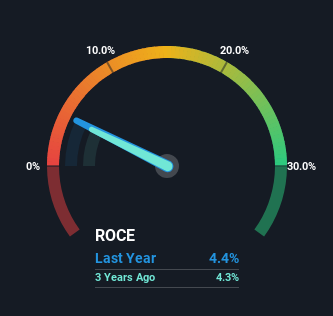- New Zealand
- /
- Telecom Services and Carriers
- /
- NZSE:CNU
Returns On Capital At Chorus (NZSE:CNU) Have Stalled
If we want to find a stock that could multiply over the long term, what are the underlying trends we should look for? Amongst other things, we'll want to see two things; firstly, a growing return on capital employed (ROCE) and secondly, an expansion in the company's amount of capital employed. Basically this means that a company has profitable initiatives that it can continue to reinvest in, which is a trait of a compounding machine. Although, when we looked at Chorus (NZSE:CNU), it didn't seem to tick all of these boxes.
Understanding Return On Capital Employed (ROCE)
For those that aren't sure what ROCE is, it measures the amount of pre-tax profits a company can generate from the capital employed in its business. To calculate this metric for Chorus, this is the formula:
Return on Capital Employed = Earnings Before Interest and Tax (EBIT) ÷ (Total Assets - Current Liabilities)
0.044 = NZ$241m ÷ (NZ$6.1b - NZ$628m) (Based on the trailing twelve months to December 2024).
Therefore, Chorus has an ROCE of 4.4%. In absolute terms, that's a low return and it also under-performs the Telecom industry average of 9.9%.
View our latest analysis for Chorus

In the above chart we have measured Chorus' prior ROCE against its prior performance, but the future is arguably more important. If you're interested, you can view the analysts predictions in our free analyst report for Chorus .
How Are Returns Trending?
Over the past five years, Chorus' ROCE and capital employed have both remained mostly flat. Businesses with these traits tend to be mature and steady operations because they're past the growth phase. So unless we see a substantial change at Chorus in terms of ROCE and additional investments being made, we wouldn't hold our breath on it being a multi-bagger. That being the case, it makes sense that Chorus has been paying out 294% of its earnings to its shareholders. These mature businesses typically have reliable earnings and not many places to reinvest them, so the next best option is to put the earnings into shareholders pockets.
What We Can Learn From Chorus' ROCE
In summary, Chorus isn't compounding its earnings but is generating stable returns on the same amount of capital employed. Since the stock has gained an impressive 46% over the last five years, investors must think there's better things to come. But if the trajectory of these underlying trends continue, we think the likelihood of it being a multi-bagger from here isn't high.
If you want to continue researching Chorus, you might be interested to know about the 2 warning signs that our analysis has discovered.
While Chorus isn't earning the highest return, check out this free list of companies that are earning high returns on equity with solid balance sheets.
New: AI Stock Screener & Alerts
Our new AI Stock Screener scans the market every day to uncover opportunities.
• Dividend Powerhouses (3%+ Yield)
• Undervalued Small Caps with Insider Buying
• High growth Tech and AI Companies
Or build your own from over 50 metrics.
Have feedback on this article? Concerned about the content? Get in touch with us directly. Alternatively, email editorial-team (at) simplywallst.com.
This article by Simply Wall St is general in nature. We provide commentary based on historical data and analyst forecasts only using an unbiased methodology and our articles are not intended to be financial advice. It does not constitute a recommendation to buy or sell any stock, and does not take account of your objectives, or your financial situation. We aim to bring you long-term focused analysis driven by fundamental data. Note that our analysis may not factor in the latest price-sensitive company announcements or qualitative material. Simply Wall St has no position in any stocks mentioned.
About NZSE:CNU
Chorus
Engages in the provision of fixed line communications infrastructure services in New Zealand.
High growth potential average dividend payer.
Market Insights
Community Narratives



